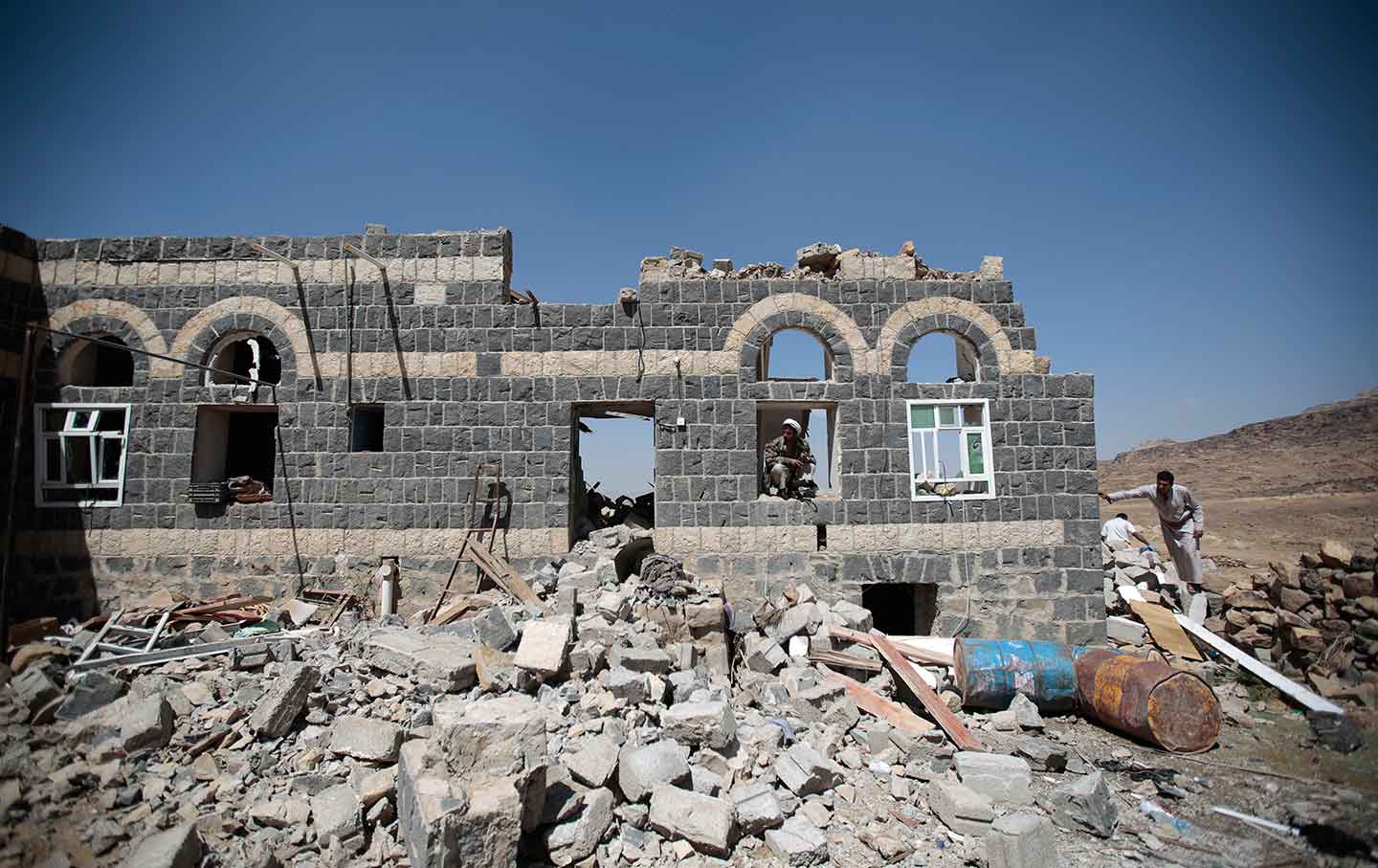
Forensic experts inspect the rubble of a house destroyed by Saudi-led airstrikes in the outskirts of Sanaa, Yemen, February 16, 2017.(AP Photo / Hani Mohammed)
Yemen, one the poorest and most neglected countries in the world, is experiencing what UNICEF identifies as “one of the world’s largest humanitarian crises.” It is estimated that a million malnourished children are at risk from cholera. The country is on the verge of widespread famine, and 20.7 million people (73 percent of Yemen’s population) are in need of humanitarian assistance.
What can be done to ease the disaster that Yemen is experiencing?
“Stop the war,” says UNICEF Executive Director Anthony Lake.
Lake is blunt. He says that “this, our generation, is scarred by the irresponsibility of governments and others to allow these things to be happening.”
One of the irresponsible governments that has involved itself in the Yemen conflict—via its military alliance with Saudi Arabia and the United Arab Emirates—is that of the United States.
The United States continues to provide massive support for Saudi Arabia’s brutal military campaign in Yemen. The group Just Foreign Policy observes that “unauthorized and unconstitutional U.S. participation in the Saudi war in Yemen…has created the largest humanitarian crisis in the world, pushing millions of human beings to the brink of famine.”
“Without US participation,” argues Just Foreign Policy, “the Saudi-UAE war in Yemen would not be possible.”
Members of Congress are taking steps to end that US participation.
Declaring that “we aim to restore Congress as the constitutionally mandated branch of government that may declare war and retain oversight over it,” Democratic Congressmen Ro Khanna of California and Mark Pocan of Wisconsin are proposing to end US targeting and refueling assistance for Saudi and UAE warplanes that are bombing Houthi forces that are backed by Iran.
By taking the side of the Saudis and their allies in what has become a proxy war between the Saudis and the Iranians, the United States has not brought stability to the region, nor has it increased prospects for peace. It has only helped to turn a horrible circumstance into a nightmare.
Congress, says Pocan, should end US involvement in a “senseless, unauthorized conflict.”
The chaos and cruelty of the Trump administration reaches new lows each week.
Trump’s catastrophic “Liberation Day” has wreaked havoc on the world economy and set up yet another constitutional crisis at home. Plainclothes officers continue to abduct university students off the streets. So-called “enemy aliens” are flown abroad to a mega prison against the orders of the courts. And Signalgate promises to be the first of many incompetence scandals that expose the brutal violence at the core of the American empire.
At a time when elite universities, powerful law firms, and influential media outlets are capitulating to Trump’s intimidation, The Nation is more determined than ever before to hold the powerful to account.
In just the last month, we’ve published reporting on how Trump outsources his mass deportation agenda to other countries, exposed the administration’s appeal to obscure laws to carry out its repressive agenda, and amplified the voices of brave student activists targeted by universities.
We also continue to tell the stories of those who fight back against Trump and Musk, whether on the streets in growing protest movements, in town halls across the country, or in critical state elections—like Wisconsin’s recent state Supreme Court race—that provide a model for resisting Trumpism and prove that Musk can’t buy our democracy.
This is the journalism that matters in 2025. But we can’t do this without you. As a reader-supported publication, we rely on the support of generous donors. Please, help make our essential independent journalism possible with a donation today.
In solidarity,
The Editors
The Nation
Khanna, a member of the House Armed Services Committee, says, “I think this can begin a major shift in foreign policy, tilting away from support for Saudi Arabia and a greater restraint in foreign intervention.”
By invoking a key section of the War Powers Act, says Peace Action’s Paul Kawika Martin,
This privileged resolution will force members of Congress to go on record, many for the first time, on the question of whether or not we should be backing a coalition that’s demonstrated an intractable disregard for human rights and the most basic laws of war. To vote for continuing U.S. support is to vote for more indiscriminate bombings of schools, marketplaces, and hospitals in one of the world’s poorest nations, and at the expense of American taxpayers and U.S. national security interests. This is another push for Congress to take back its constitutional authority to declare war, that for political expediency it has handed over to the President.
Among the House members who are prepared to go on the record are a pair of Republicans who have long been concerned about the failure of Congress to provide adequate oversight regarding US engagement on undeclared wars—Thomas Massie of Kentucky and Walter Jones of North Carolina.
Their attempt to get members of Congress to embrace their constitutionally defined duty to make decisions about whether the United States should involve itself in wars around the world could still face hurdles. House Speaker Paul Ryan (R-WI) has gone out of his way to block congressional action that might check and balance the Trump administration’s militarism. But the Khanna-Pocan-Massie-Jones initiative seeks to go around Ryan and force a vote. If they succeed, this opens up the possibility that a Congress that has been derelict in its duty might actually get on the right side of history—and play a real role in addressing one of the world’s largest humanitarian crises.
John NicholsTwitterJohn Nichols is a national affairs correspondent for The Nation. He has written, cowritten, or edited over a dozen books on topics ranging from histories of American socialism and the Democratic Party to analyses of US and global media systems. His latest, cowritten with Senator Bernie Sanders, is the New York Times bestseller It's OK to Be Angry About Capitalism.